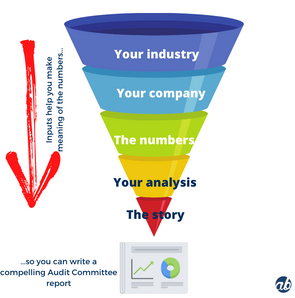What issues concern your Audit Committee?
Like leaders in finance themselves, Audit Committees are under intense pressure at the moment to discharge their responsibilities in this difficult climate. Have you seen this list of questions directed specifically to your Audit Committee members released by the Australian Institute of Company Directors? Phew - that's a long list.
But the emphasis is clear: now is the time to make sure your Audit Committee report is clear, concise and captures the most important elements of the financial reporting control environment in your organisation.
What are the assumptions that might be reducing the quality of your Audit Committee report?
Accuracy is the foundation of an effective financial reporting environment and it is easy to assume that your Audit Committee want exhaustive analysis on how every number in your financial report is accurate. Note: the operative word in that sentence is exhausting.
Gone are the days that your Audit Committee expect reams of papers to consume in the 2 weeks leading up to the Audit Committee meeting. They expect the papers to be electronic, and they expect them to be succinct, insightful AND allow them to discharge their responsibilities. The game has changed.
According to the ASIC website, "An audit committee is a committee of the board of directors that focuses on issues relevant to the integrity of the company's financial reporting." If you're skim reading and focusing on key words, 'relevance' is the key word of note here.
If you assume that your Audit Committee want war and peace on the biggest numbers on your financial report, then you may be on a path to long days, late nights and hours of misery. If your paper passes the old school 'thud' test (you know the one - when it makes the 'thud' sound when you drop it on your desk), then you are increasing your risk of error due to internal inconsistencies and changes across versions. Thus contradicting everything you have worked so hard for during your year-end crunch time.
"Create relevance, not just awareness"
What can you do to arrive at the best outcome for your Audit Committee?
Understand what your Audit Committee wants from your paper. Where do they see the specific risks in your organisation, where do they want to see under the hood and learn more about how particular assumptions are fed into a valuation? What do they want to know about your operational culture when put under stress and in particular, what you've implemented to reduce the risk that the effects of COVID-19 may have a detrimental impact on the accuracy? Take a look at other questions they might be interested in knowing about how you've handled the pandemic here.
It is common for leaders in finance to get bogged down in the detail and overlook the following:
• You need to understand the people: In short, you need to understand the individuals in the Audit Committee and especially the Chair. You need to get to know them and what they need from you, because this will be the most efficient and effective path to producing an Audit Committee paper that hits the mark. Do you have a briefing session already booked in the calendar with your Audit Committee Chair? Have you invited the person in your team responsible for the first draft?
• The depth is in the discussion: Your report's purpose should be to facilitate the relevant discussion, but provide evidence that the quality of your financial report is sound. Think of your report like an accordion file: it needs to be succinct, and it needs to demonstrate depth. Often your section of the Audit Committee meeting will, whilst you may have 30 minutes on the agenda, be reduced to 10 minutes. In that 10 minutes, the Committee members need to be assured of the accuracy of your process and be able to have a robust and laser focused conversation around the key areas that matter. On the other side of that spectrum, your paper needs to act as a document that will effectively facilitate a 60 minute conversation if needed.
• The Audit Committee already reads the financial report: There is no need to restate anything that it already covered in your Annual Report, Accounting Policies or Disclosures. Pull that out, and address the relevant issues instead.
Restating information like this doesn't add value. Focus on what's relevant.
The most important thing is to start now. Get most of it done before your peak stress period starts and while your head is still fresh. Audit Committee papers that are laborious and long indicate that the thinking, analysis and evaluation hasn't been done during its preparation process. As a result, your pre-Committee meeting session with your Audit Committee chair will be long and tedious, while they ask detailed questions in response to your detailed report. Get to the point and focus on what matters.
Meaning Matters: Focus on the story behind the numbers
Your Audit Committee are interested in the meaning behind the numbers: what does a large deferred revenue balance actually mean? Investors are interested in the story: what does an asset write-off tell us about the future market value of the entity?.
It is your job to tell the story, not just show the numbers, and this is far more difficult. Here are 3 steps to get you started:
1. Know your organisation's story and strategy. Get hold of the strategy on a page and revisit the vision and values as presented on your website. What does that tell you about the mission your company is working to achieve? What are the measures and KPIs and how has the business performed this year relative to these measures? What does this tell you about the favourability of the financial results in the ledger? Do the analytics now make sense given the conversations you've been having with the business throughout the year. Share the story behind the numbers in the context of the business objectives and performance: you will be delighted to find that the language is far easier and more compelling which makes writing audit committee papers enjoyable (almost!).
2. Understand the broader context. Know your industry nuances. Being a value driven leader in finance involves bringing industry thought leadership to your stakeholders to help them make more informed decisions. Being able to provide information and insight that isn't in your financial report goes a long way to demonstrating the robustness of your evaluation of the financial results.
3. Be clear: provide certainty where there is ambiguity. ASIC's areas of focus always include areas of judgment because their reviews identify that appropriate analysis, challenge and evaluation continue to fall short of expectations. The shortfall exists because those areas are hard. Use your Audit Committee for the expertise they have and set yourselves up for this discussion with the Audit Committee.
Remember the golden rule: the Audit Committee report is just one part of a bigger conversation with your Board of Directors. Think about the big picture and make sure your Audit Committee report is on point, relevant and doesn't take over.



